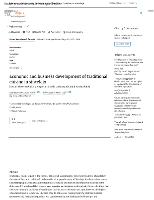Abstract
Traditional cuisine is part of the cultural heritage of a community. The research aims to characterize the state of food and traditional kitchens offered in popular areas of Sincelejo, for their enhancement. Sociodemographic, business and cultural characteristics and barriers to productive inclusion were determined. It was found that women have a greater participation in this activity. It was identified that there are minimum quality of life conditions such as access to health and a job, however, the highest educational level is technician. Likewise, they do not receive training from the state for business generation and strengthening, which was corroborated by not finding in the Municipal and Departmental Development Plans activities related to the safeguarding and promotion of traditional cuisine. The academic level continues to be an obstacle, which represents a generational poverty trap and the little recognition of local administrations of traditional cuisines influences the processes of strengthening and safeguarding, which results in the quality of life and satisfaction of basic needs of traditional cooks. © 2020, Universidad del Zulia. All rights reserved.














